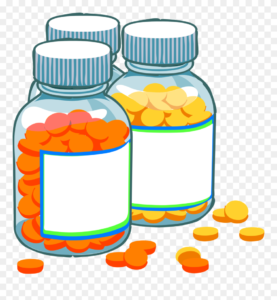Do you know that there is a strong correlation between ADHD and vitamin deficiencies? A lot of people don’t realize this, but it’s true. Research has shown that up to 50% of children with ADHD have low levels of certain vitamins and minerals. This can cause many problems, including difficulty paying attention in school and poor impulse control. Thankfully, there are supplements available that can help address these issues. In this blog post, we will discuss the link between ADHD and vitamin deficiencies, as well as the benefits of taking supplements for people with this condition.
Contents
Defining ADHD
ADHD stands for Attention Deficit Hyperactivity Disorder. It is a mental disorder that is characterized by problems with focus, hyperactivity, and impulsiveness. People with ADHD often have difficulty paying attention in school or at work, and they may also act impulsively without thinking about the consequences of their actions.
ADHD can also cause problems in social situations and relationships. People with this condition may be perceived as being disruptive or disrespectful, and they may have difficulty maintaining close friendships or romantic relationships.
The Link Between ADHD and Vitamin Deficiencies

As we mentioned before, research has shown that up to 50% of children with ADHD have low levels of certain vitamins and minerals. This is a very high number, and it highlights the importance of getting enough of these nutrients for people with this condition. This can cause many problems, including difficulty paying attention in school and poor impulse control.
Vitamin deficiencies can also lead to other health problems, such as fatigue, anxiety, depression, and trouble sleeping. It’s important to note that not all children with ADHD will have vitamin deficiencies, but it is a common issue.
Some of the most important vitamins and minerals for people with ADHD are omega-three fatty acids, iron, magnesium, zinc, and vitamin B12.
- Omega-three fatty acids are essential for brain development and function.
- Iron is necessary for the production of dopamine, a neurotransmitter that play plays a role in attention and focus.
- Magnesium helps with nerve transmission and muscle function.
- Zinc is involved in many different biochemical reactions in the body, including those that affect mood and behavior.
- Vitamin B12 is essential for the formation of red blood cells and the proper functioning of the nervous system.
A combination and balance of these nutrients are necessary for people with ADHD. If you or someone you know has this condition, talk to a doctor about whether or not taking supplements would be beneficial.
Benefits of Taking Supplements for People with ADHD
There are many benefits of taking supplements for people with ADHD.
- First and foremost, it can help improve symptoms by addressing deficiencies in key vitamins and minerals.
- Additionally, taking supplements can help to improve focus and attention, as well as impulse control. This can lead to better performance in school or at work, and it can also reduce the risk of accidents or injuries.
- Furthermore, getting enough of the right nutrients can also help prevent other health problems that are often associated with ADHD, such as fatigue, anxiety, depression, and trouble sleeping.
- Taking supplements can also help to improve mood and reduce anxiety or depression. This can make it easier to socialize and build relationships.
If you or someone you know has ADHD, talk to a doctor about the possibility of taking supplements. It may be the key to improving symptoms and quality of life.
Which Foods To Eat For ADHD?

Certain foods are particularly beneficial for people with ADHD. These include:
- Omega-three fatty acids: found in fish, nuts, and seeds.
- Iron: found in meat, poultry, seafood, beans, and dark leafy greens.
- Magnesium: found in dark chocolate, green leafy vegetables, nuts, and seeds.
- Zinc: found in meat, poultry, seafood, beans, and whole grains.
- Vitamin B12: found in meat, poultry, eggs, and dairy products.
Eating a diet that includes these foods can help to improve symptoms of ADHD by addressing vitamin deficiencies. Additionally, these foods contain nutrients that are known to be beneficial for brain function and overall health.
There are many benefits to taking supplements for people with ADHD. However, it is also important to eat a healthy diet that includes foods that are rich in vitamins and minerals. This can help to improve symptoms and overall health.
If you are considering taking supplements for ADHD, it is important to speak with your doctor first. They can help you to determine if you have a vitamin deficiency and which supplements would be best for you. Additionally, they can monitor your progress and ensure that the supplements are safe for you to take.
Things To Consider
When taking vitamins for ADHD, there are a few things to consider.
- First, it is important to speak with your doctor before starting any supplement regimen. They can help you to determine if you have a vitamin deficiency and which supplements would be best for you. Additionally, they can monitor your progress and ensure that the supplements are safe for you to take.
- Second, it is essential to take the recommended dosage of each supplement. Overdosing on vitamins and minerals can lead to serious health problems. Therefore, it is essential to follow the instructions of your doctor or the manufacturer of the supplement.
- Third, it is important to be aware of the potential side effects of taking supplements. Some people may experience gastrointestinal upset or headaches when taking certain supplements. However, these side effects are typically mild and resolve on their own. If you experience any severe side effects, it is important to speak with your doctor immediately.
Alternative Methods
There are many alternative methods that many alternative methods can be used to improve symptoms of ADHD. These include:
- Stimulant medication: often prescribed to people with ADHD, stimulant medication can help to improve focus and attention.
- Non-stimulant medication: non-stimulant medication can also be prescribed to people with ADHD. This type of medication can help to improve focus, attention, and impulsivity.
- Behavioral therapy: this type of therapy can help people with ADHD t learn new skills and strategies for managing their symptoms.
- Counseling: counseling can help people with ADHD to manage their symptoms and improve their quality of life.
- Lifestyle changes: making lifestyle changes, such as exercising and eating a healthy diet, can also help to improve symptoms of ADHD.
- Biofeedback: this method uses sensors to help people with ADHD to learn to control their body and mind.
- Acupuncture: this ancient Chinese practice can help to improve symptoms of ADHD by promoting relaxation and balance.
- Exercise: Regular exercise can help to improve focus, attention, and impulsivity in people with ADHD.
Conclusion
To conclude the above, there are many benefits to taking vitamins for people with ADHD. However, it is also important to eat a healthy diet that includes foods that are rich in vitamins and minerals. This can help to improve symptoms and overall health. If you are considering taking supplements for ADHD, it is important to speak with your doctor first. They can help you determine if you have a vitamin deficiency and which supplements would be best for you. Many different methods can be used to improve symptoms of ADHD.
For more information, please contact MantraCare. ADHD is a neurodevelopmental disorder characterized by difficulty in paying attention, hyperactivity, and impulsivity. If you have any queries regarding Online ADHD Counseling experienced therapists at MantraCare can help: Book a trial ADHD therapy session


